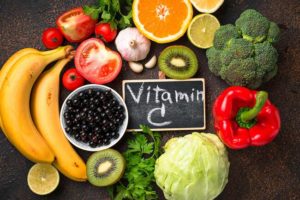Diet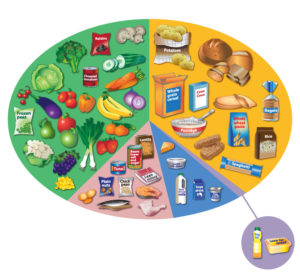
In the last post we looked at the role of exercise on health. Today we will take a look at the importance of diet.
Our diet is incredibly important to our health. It is the fuel that powers our body, our organs, our mood. It is what provides us with energy to not only undertake our general daily activities and movements, but also intrinsic factors, such as the function of our vital organs, our breathing, blinking and so on.
It is recommended that men consume around 2,500 calories per day and women consume around 2,000 calories per day.
Calories are the measurement of energy. Everything we do burns calories, or energy. If we eat too many calories for the amount of activity we do, then we will end up with surplus energy that will lead to weight gain. If we consume too little calories, then we will be in an energy deficit that will lead to weight loss.
Our calorie intake should be adapted to how active our lifestyle is. Most people consume more calories than what is needed.
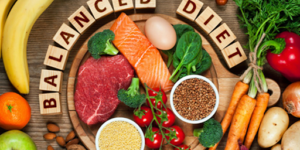
So, what are some tips for eating well and being healthy? The NHS’s Eat Well guide makes some simple guidelines:
-
Base meals on high fibre starchy carbohydrates.
These should make up a third of the food we eat. High fibre, wholegrain varieties, such as brown pasta/rice, and potatoes contain more fibre than white/refined starchy carbohydrates and so help to keep us feeling full for longer.
-
Eat lots of fruit and veg.
It is recommended to consume 5 portions per day. Fresh, canned, dry, or juiced. Fruit juice and smoothies should be limited as they are often very sugary.
-
Eat plenty of fish, including oily fish.
At least 2 portions, including 1 oily, per week is recommended. Oily fish is high in Omega-3, which may help prevent heart disease.
Non Oily Fish includes:
– haddock
– plaice
– cod
– tunaOily Fish include:
– salmon
– mackerel
– sardines -
Cut down on saturated fat and sugar
Saturated Fats
Some fat is important in our diet, but it is important to be aware of the type of fat we are eating. Too much saturated fat may increase cholesterol levels and increase risk of heart disease.
Men should have no more than 30g per day. Women should have no more than 20g per day.Saturated fat is found in the following:
– sausages
– butter
– cream
– cakes
– biscuitsIt is advisable to cut down on saturated fats and choose foods containing unsaturated fats, such as avocados, oily fish, and lean cuts of meat.
Sugar
Foods and drinks high in sugar increase the risk of obesity and tooth decay. They are usually very high in calories and can lead to weight gain if consumed too regularly.Free sugars are found in:
– fizzy drinks
– sugary breakfast cereals
– pastries and puddings
– alcoholic drinks
– sweets, cakes, biscuits. -
Limit salt: less than 6g per day.
Too much salt can raise our blood pressure. High blood pressure can lead to heart disease and stroke. About ¾ of the salt we eat is already in the food when we buy it. Such as soups, cereals, bread and sauces.
-
Drink plenty of fluids
Drinking plenty of fluids avoids dehydration. It is recommended to consume 6-8 glasses per day
-
Don’t skip breakfast
A healthy breakfast high in fibre, low in fat, sugar and salt forms part of a healthy diet.
Antioxidants
Our diet can really affect our health in many ways. The foods we consume can have an impact on such things as fighting infections. A diet rich in antioxidants play a role in supporting and strengthening our immune system.
Vitamin C is an important antioxidant. Low levels of this vitamin may impair immunity and increase susceptibility to infections – Study Here
Vitamin C supplementation has also been shown to shorten the duration and severity of the common cold Study Here
Great sources of vitamin C include:
– Red Bell Pepper
– Oranges
– Kale
– Strawberries
– Kiwi Fruit
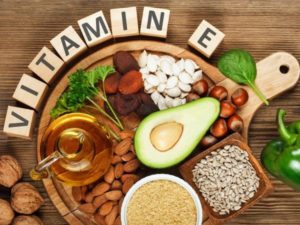
Vitamin E is another vitamin rich in antioxidant properties. It may have an effect on fighting respiratory tract infections. One study found that intake of Vitamin E, as well as vitamin C, had an inverse association with the incidence of upper respiratory tract infection in women. Study Here
Food that are high in Vitamin E are:
– Spinach
– Avocados
– Squash
– Olive Oil
– Sunflower Seeds and almonds
Mood
The power of our diet is large. It is very closely linked to our mental health, a bad diet will have a adverse affect on our mood.
The infographic from Larkr below, illustrates how diet can have a positive and negative influence on our mood:
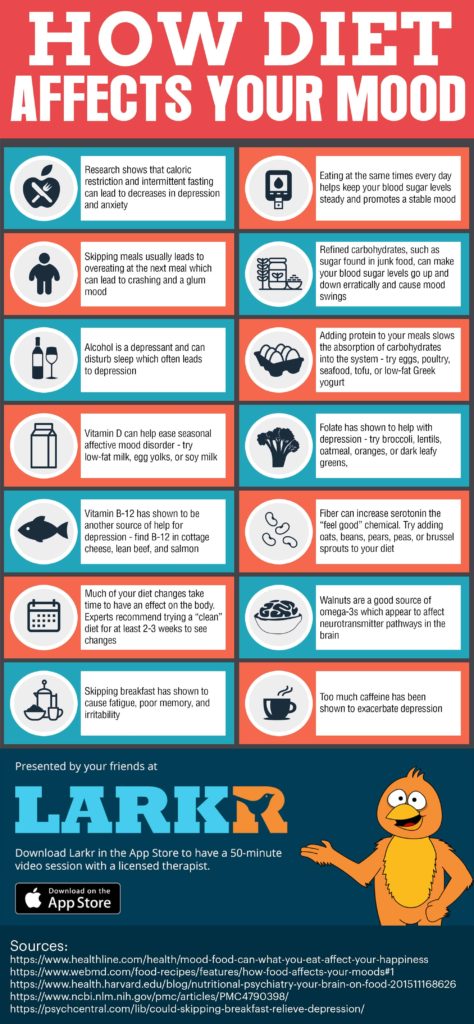
Maintaining a diet consisting of adequate calories, sufficient liquid intake, and a wide variety of colourful, nutritious foods is important to sustaining a healthy lifestyle.
A great diet, coupled with an active lifestyle that meets the minimum guidelines outlined in the previous post, gives us the foundations for good health and the barriers for withstanding illness.
In the last post in this series we will take a look at mindfulness and how focussing on our mental health is equally as important in keeping well during challenging times.
Alex

